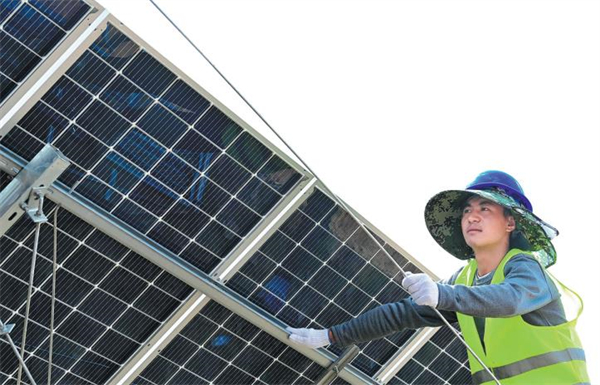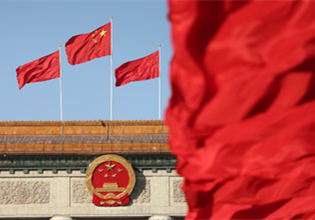Inner Mongolia to boost high-quality development with energy, agriculture

A worker tends to a photovoltaic power station project in Ordos, Inner Mongolia autonomous region, on Aug 27. [WANG ZHENG/FOR CHINA DAILY]
North China's Inner Mongolia autonomous region will optimize and upgrade its traditional industries with its strengths in coal, rare earth elements, wind and solar energy and agriculture, to promote high-quality development, the nation's economic regulator said on Thursday.
The autonomous region will also ramp up efforts to boost foreign trade and improve the environment, it added.
Guo Lanfeng, a senior official from the National Development and Reform Commission, said during a news conference on Thursday that Inner Mongolia will further optimize its industrial structure and explore new paths for economic development in resource-rich areas.
The autonomous region boasts abundant wind and solar resources and produces over one-third of the country's coal supply. It also ranks first in power transmission to other provincial-level regions and new energy power generation, said Huang Zhiqiang, executive vice-chairman of the regional government.
Additionally, in the agricultural sector, the autonomous region ranks sixth in grain production and leads the nation in production volumes of milk, mutton, beef and cashmere, Huang said.
"Efforts are expected to be made to build a new energy system which is crucial to enhancing the nation's energy supply ability. We also aim to accelerate the modernization of agriculture and animal husbandry to improve the comprehensive production capacity of critical agricultural and livestock production bases," Guo said, adding that the goal is to lift Inner Mongolia's comprehensive economic strength to the national medium level and its household income to the national average level by 2027.
Guo said the autonomous region's GDP currently ranks 21st nationwide among its peers. Last year, its per capita income stood at 35,921 yuan ($4,930), slightly below the national average of 36,883 yuan.
To drive high-quality development in Inner Mongolia, the State Council, the nation's Cabinet, recently issued a document, which outlines seven key tasks and various support measures.
Energy resources, agriculture and husbandry are not only Inner Mongolia's main advantages, but also serve as critical support to the nation. In addition, the region's rare earth resources hold a prominent position in the country's new material industry, Guo said.
Zheng Hongfan, a senior publicity official of Inner Mongolia, said there will also be more efforts to facilitate trade and cooperation with Mongolia and Russia in sectors including energy and mineral resources, agriculture and animal husbandry, infrastructure and environmental protection.



 Print
Print Mail
Mail





